BSM 780: Sustainable Business Planning & Strategy Report, Dubai Hotel
VerifiedAdded on 2023/04/21
|23
|5130
|128
Report
AI Summary
This report delves into sustainable business planning and strategy within the hospitality sector, specifically examining the food and beverage management practices of Media Rotana, a Dubai-based hotel. It begins with an introduction to the concept of sustainability and its growing importance in the industry. The report then provides a detailed literature review, exploring sustainable development, sustainability in food and beverage practices, and the challenges associated with implementation. The methodology section outlines the research philosophy, design, data collection methods, and analysis techniques used in the study. The findings section presents the results of the research, including a project budget. The report concludes with recommendations for Media Rotana and a discussion of the broader implications of sustainable practices in the hospitality industry.

Sustainable Business Planning & Strategy
2 / 1 4 / 2 0 1 9
2 / 1 4 / 2 0 1 9
Paraphrase This Document
Need a fresh take? Get an instant paraphrase of this document with our AI Paraphraser
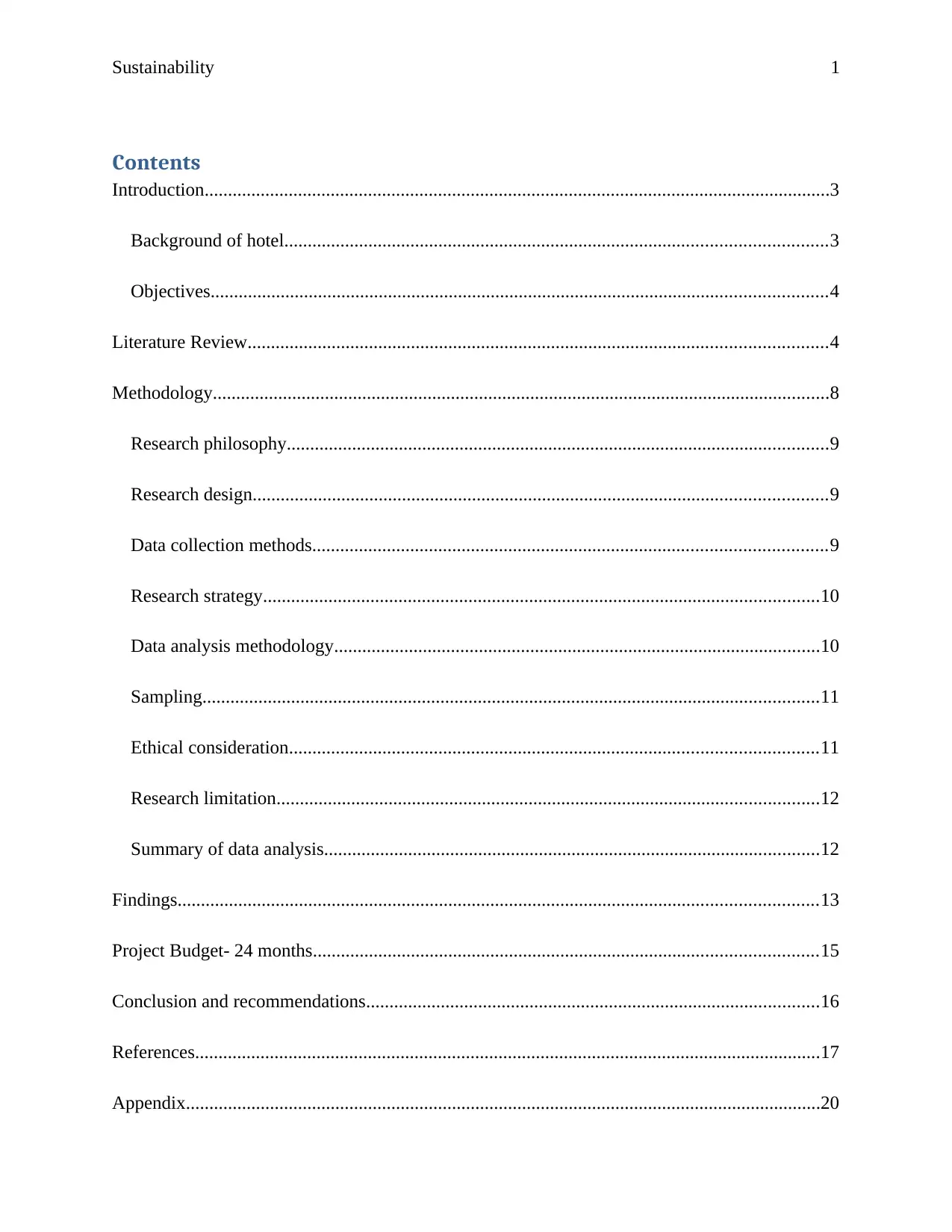
Sustainability 1
Contents
Introduction......................................................................................................................................3
Background of hotel....................................................................................................................3
Objectives....................................................................................................................................4
Literature Review............................................................................................................................4
Methodology....................................................................................................................................8
Research philosophy....................................................................................................................9
Research design...........................................................................................................................9
Data collection methods..............................................................................................................9
Research strategy.......................................................................................................................10
Data analysis methodology........................................................................................................10
Sampling....................................................................................................................................11
Ethical consideration.................................................................................................................11
Research limitation....................................................................................................................12
Summary of data analysis..........................................................................................................12
Findings.........................................................................................................................................13
Project Budget- 24 months............................................................................................................15
Conclusion and recommendations.................................................................................................16
References......................................................................................................................................17
Appendix........................................................................................................................................20
Contents
Introduction......................................................................................................................................3
Background of hotel....................................................................................................................3
Objectives....................................................................................................................................4
Literature Review............................................................................................................................4
Methodology....................................................................................................................................8
Research philosophy....................................................................................................................9
Research design...........................................................................................................................9
Data collection methods..............................................................................................................9
Research strategy.......................................................................................................................10
Data analysis methodology........................................................................................................10
Sampling....................................................................................................................................11
Ethical consideration.................................................................................................................11
Research limitation....................................................................................................................12
Summary of data analysis..........................................................................................................12
Findings.........................................................................................................................................13
Project Budget- 24 months............................................................................................................15
Conclusion and recommendations.................................................................................................16
References......................................................................................................................................17
Appendix........................................................................................................................................20
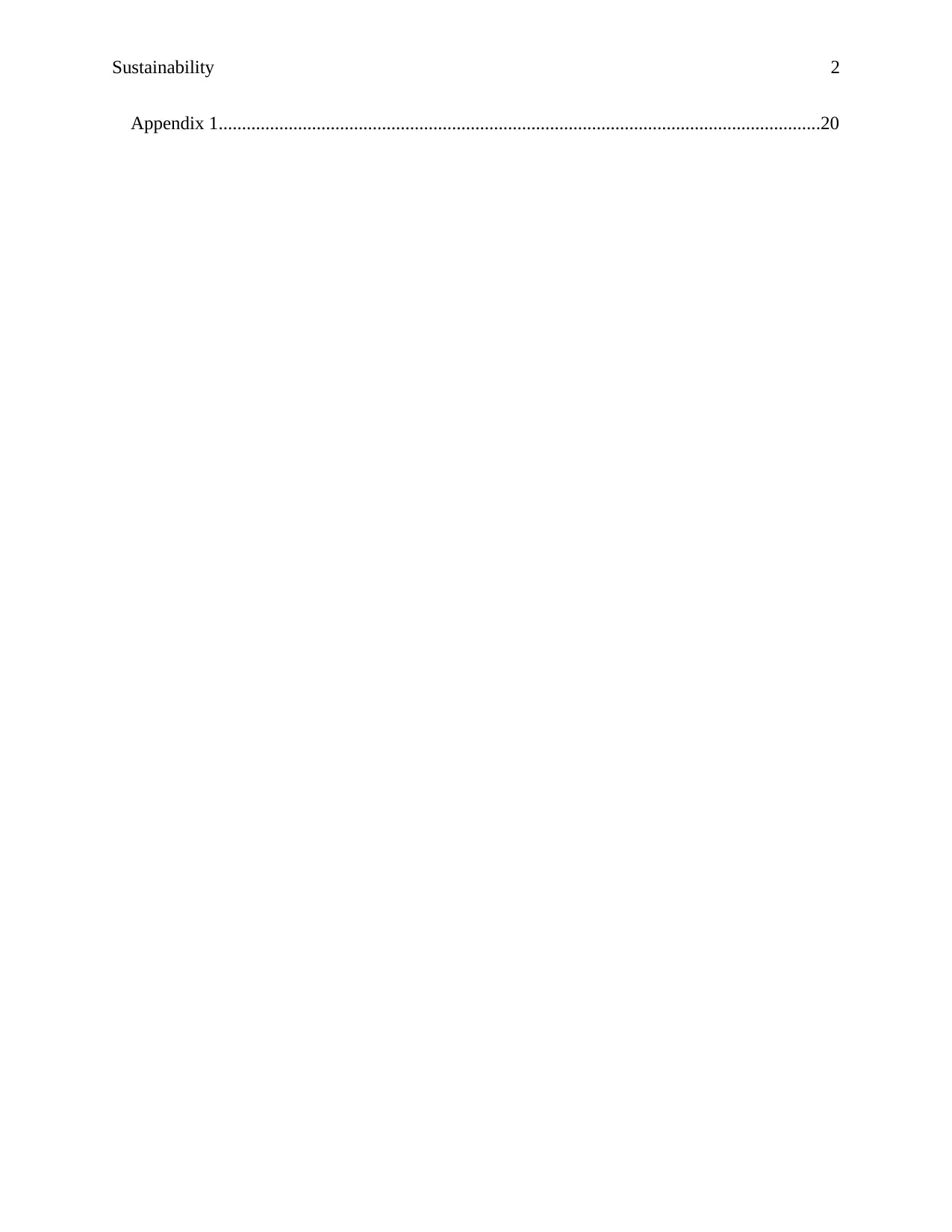
Sustainability 2
Appendix 1.................................................................................................................................20
Appendix 1.................................................................................................................................20
⊘ This is a preview!⊘
Do you want full access?
Subscribe today to unlock all pages.

Trusted by 1+ million students worldwide
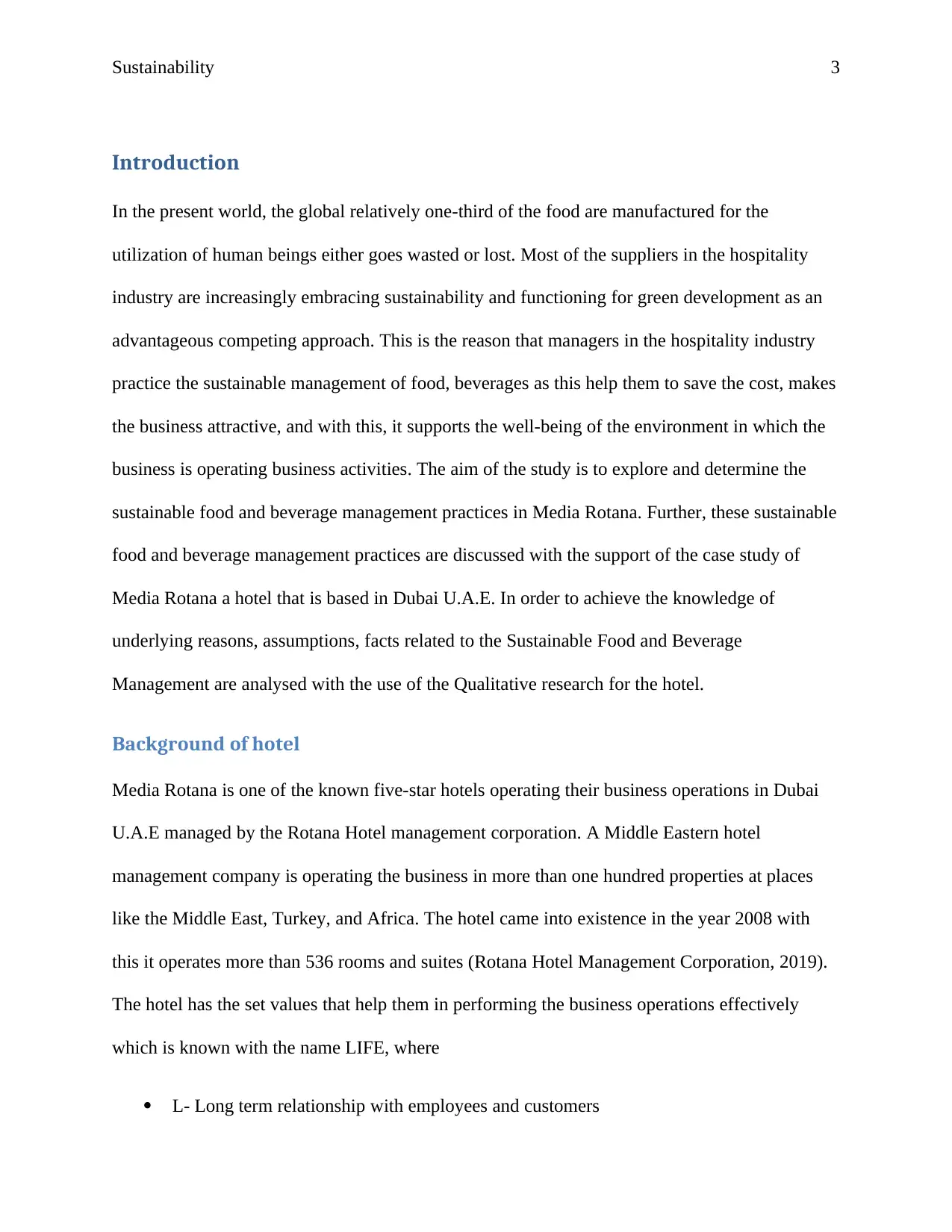
Sustainability 3
Introduction
In the present world, the global relatively one-third of the food are manufactured for the
utilization of human beings either goes wasted or lost. Most of the suppliers in the hospitality
industry are increasingly embracing sustainability and functioning for green development as an
advantageous competing approach. This is the reason that managers in the hospitality industry
practice the sustainable management of food, beverages as this help them to save the cost, makes
the business attractive, and with this, it supports the well-being of the environment in which the
business is operating business activities. The aim of the study is to explore and determine the
sustainable food and beverage management practices in Media Rotana. Further, these sustainable
food and beverage management practices are discussed with the support of the case study of
Media Rotana a hotel that is based in Dubai U.A.E. In order to achieve the knowledge of
underlying reasons, assumptions, facts related to the Sustainable Food and Beverage
Management are analysed with the use of the Qualitative research for the hotel.
Background of hotel
Media Rotana is one of the known five-star hotels operating their business operations in Dubai
U.A.E managed by the Rotana Hotel management corporation. A Middle Eastern hotel
management company is operating the business in more than one hundred properties at places
like the Middle East, Turkey, and Africa. The hotel came into existence in the year 2008 with
this it operates more than 536 rooms and suites (Rotana Hotel Management Corporation, 2019).
The hotel has the set values that help them in performing the business operations effectively
which is known with the name LIFE, where
L- Long term relationship with employees and customers
Introduction
In the present world, the global relatively one-third of the food are manufactured for the
utilization of human beings either goes wasted or lost. Most of the suppliers in the hospitality
industry are increasingly embracing sustainability and functioning for green development as an
advantageous competing approach. This is the reason that managers in the hospitality industry
practice the sustainable management of food, beverages as this help them to save the cost, makes
the business attractive, and with this, it supports the well-being of the environment in which the
business is operating business activities. The aim of the study is to explore and determine the
sustainable food and beverage management practices in Media Rotana. Further, these sustainable
food and beverage management practices are discussed with the support of the case study of
Media Rotana a hotel that is based in Dubai U.A.E. In order to achieve the knowledge of
underlying reasons, assumptions, facts related to the Sustainable Food and Beverage
Management are analysed with the use of the Qualitative research for the hotel.
Background of hotel
Media Rotana is one of the known five-star hotels operating their business operations in Dubai
U.A.E managed by the Rotana Hotel management corporation. A Middle Eastern hotel
management company is operating the business in more than one hundred properties at places
like the Middle East, Turkey, and Africa. The hotel came into existence in the year 2008 with
this it operates more than 536 rooms and suites (Rotana Hotel Management Corporation, 2019).
The hotel has the set values that help them in performing the business operations effectively
which is known with the name LIFE, where
L- Long term relationship with employees and customers
Paraphrase This Document
Need a fresh take? Get an instant paraphrase of this document with our AI Paraphraser
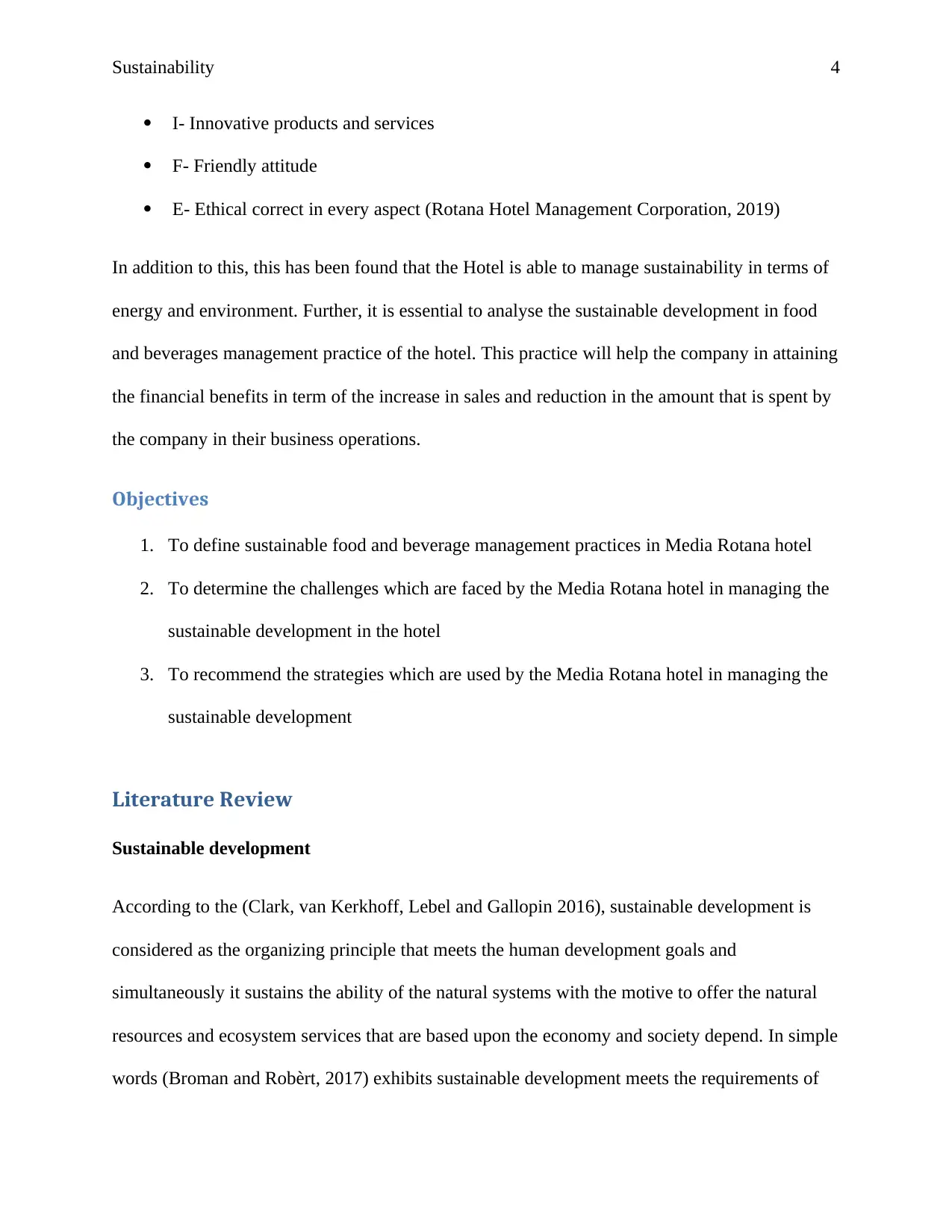
Sustainability 4
I- Innovative products and services
F- Friendly attitude
E- Ethical correct in every aspect (Rotana Hotel Management Corporation, 2019)
In addition to this, this has been found that the Hotel is able to manage sustainability in terms of
energy and environment. Further, it is essential to analyse the sustainable development in food
and beverages management practice of the hotel. This practice will help the company in attaining
the financial benefits in term of the increase in sales and reduction in the amount that is spent by
the company in their business operations.
Objectives
1. To define sustainable food and beverage management practices in Media Rotana hotel
2. To determine the challenges which are faced by the Media Rotana hotel in managing the
sustainable development in the hotel
3. To recommend the strategies which are used by the Media Rotana hotel in managing the
sustainable development
Literature Review
Sustainable development
According to the (Clark, van Kerkhoff, Lebel and Gallopin 2016), sustainable development is
considered as the organizing principle that meets the human development goals and
simultaneously it sustains the ability of the natural systems with the motive to offer the natural
resources and ecosystem services that are based upon the economy and society depend. In simple
words (Broman and Robèrt, 2017) exhibits sustainable development meets the requirements of
I- Innovative products and services
F- Friendly attitude
E- Ethical correct in every aspect (Rotana Hotel Management Corporation, 2019)
In addition to this, this has been found that the Hotel is able to manage sustainability in terms of
energy and environment. Further, it is essential to analyse the sustainable development in food
and beverages management practice of the hotel. This practice will help the company in attaining
the financial benefits in term of the increase in sales and reduction in the amount that is spent by
the company in their business operations.
Objectives
1. To define sustainable food and beverage management practices in Media Rotana hotel
2. To determine the challenges which are faced by the Media Rotana hotel in managing the
sustainable development in the hotel
3. To recommend the strategies which are used by the Media Rotana hotel in managing the
sustainable development
Literature Review
Sustainable development
According to the (Clark, van Kerkhoff, Lebel and Gallopin 2016), sustainable development is
considered as the organizing principle that meets the human development goals and
simultaneously it sustains the ability of the natural systems with the motive to offer the natural
resources and ecosystem services that are based upon the economy and society depend. In simple
words (Broman and Robèrt, 2017) exhibits sustainable development meets the requirements of
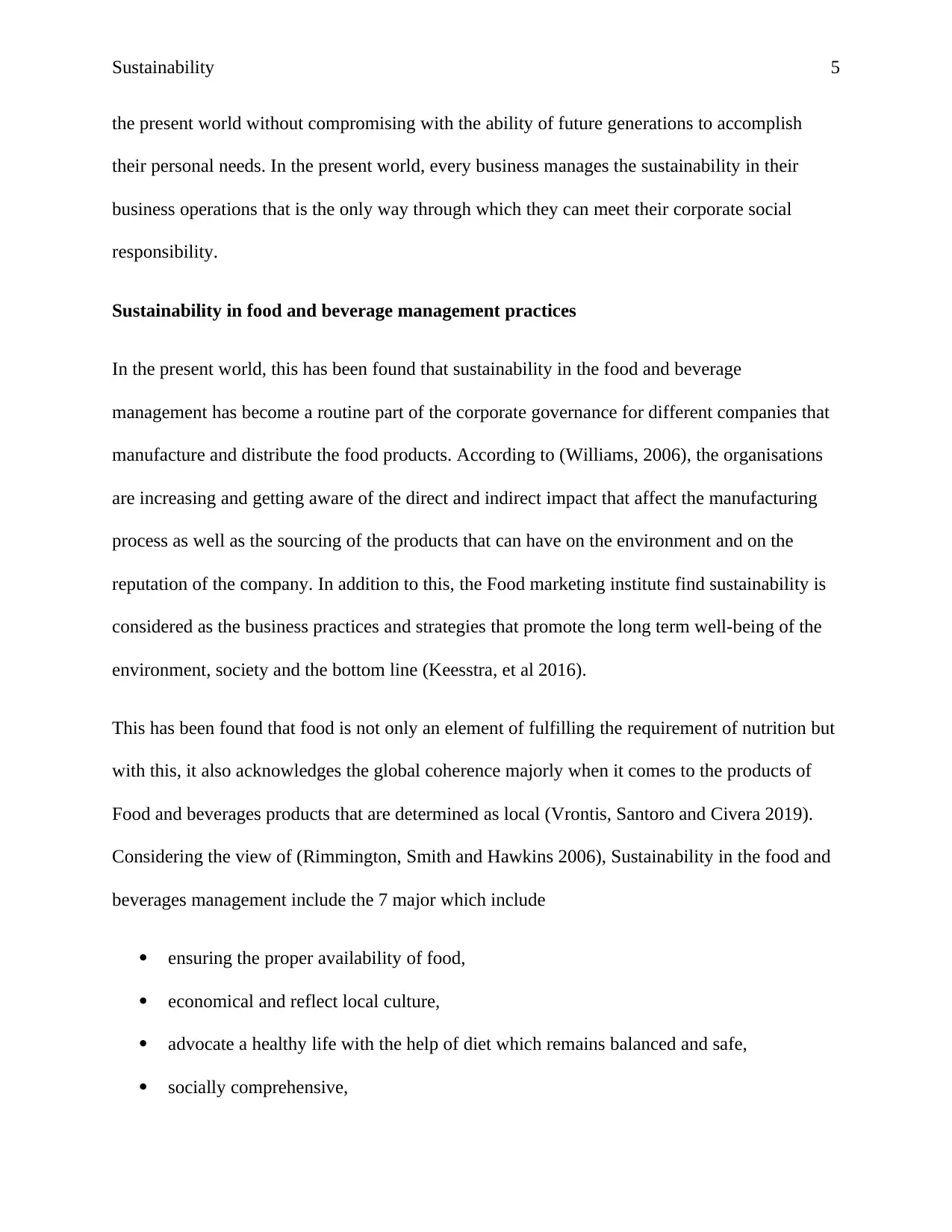
Sustainability 5
the present world without compromising with the ability of future generations to accomplish
their personal needs. In the present world, every business manages the sustainability in their
business operations that is the only way through which they can meet their corporate social
responsibility.
Sustainability in food and beverage management practices
In the present world, this has been found that sustainability in the food and beverage
management has become a routine part of the corporate governance for different companies that
manufacture and distribute the food products. According to (Williams, 2006), the organisations
are increasing and getting aware of the direct and indirect impact that affect the manufacturing
process as well as the sourcing of the products that can have on the environment and on the
reputation of the company. In addition to this, the Food marketing institute find sustainability is
considered as the business practices and strategies that promote the long term well-being of the
environment, society and the bottom line (Keesstra, et al 2016).
This has been found that food is not only an element of fulfilling the requirement of nutrition but
with this, it also acknowledges the global coherence majorly when it comes to the products of
Food and beverages products that are determined as local (Vrontis, Santoro and Civera 2019).
Considering the view of (Rimmington, Smith and Hawkins 2006), Sustainability in the food and
beverages management include the 7 major which include
ensuring the proper availability of food,
economical and reflect local culture,
advocate a healthy life with the help of diet which remains balanced and safe,
socially comprehensive,
the present world without compromising with the ability of future generations to accomplish
their personal needs. In the present world, every business manages the sustainability in their
business operations that is the only way through which they can meet their corporate social
responsibility.
Sustainability in food and beverage management practices
In the present world, this has been found that sustainability in the food and beverage
management has become a routine part of the corporate governance for different companies that
manufacture and distribute the food products. According to (Williams, 2006), the organisations
are increasing and getting aware of the direct and indirect impact that affect the manufacturing
process as well as the sourcing of the products that can have on the environment and on the
reputation of the company. In addition to this, the Food marketing institute find sustainability is
considered as the business practices and strategies that promote the long term well-being of the
environment, society and the bottom line (Keesstra, et al 2016).
This has been found that food is not only an element of fulfilling the requirement of nutrition but
with this, it also acknowledges the global coherence majorly when it comes to the products of
Food and beverages products that are determined as local (Vrontis, Santoro and Civera 2019).
Considering the view of (Rimmington, Smith and Hawkins 2006), Sustainability in the food and
beverages management include the 7 major which include
ensuring the proper availability of food,
economical and reflect local culture,
advocate a healthy life with the help of diet which remains balanced and safe,
socially comprehensive,
⊘ This is a preview!⊘
Do you want full access?
Subscribe today to unlock all pages.

Trusted by 1+ million students worldwide
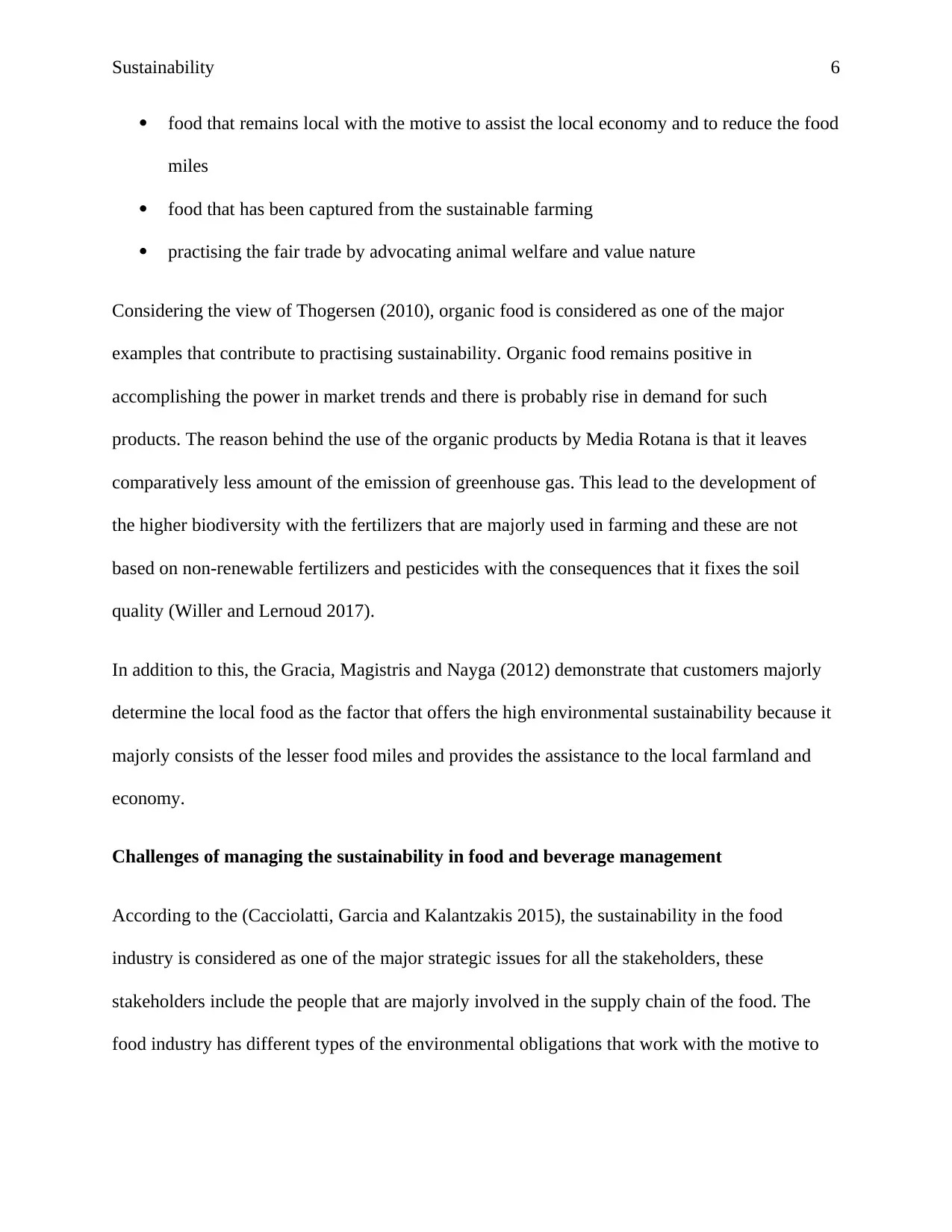
Sustainability 6
food that remains local with the motive to assist the local economy and to reduce the food
miles
food that has been captured from the sustainable farming
practising the fair trade by advocating animal welfare and value nature
Considering the view of Thogersen (2010), organic food is considered as one of the major
examples that contribute to practising sustainability. Organic food remains positive in
accomplishing the power in market trends and there is probably rise in demand for such
products. The reason behind the use of the organic products by Media Rotana is that it leaves
comparatively less amount of the emission of greenhouse gas. This lead to the development of
the higher biodiversity with the fertilizers that are majorly used in farming and these are not
based on non-renewable fertilizers and pesticides with the consequences that it fixes the soil
quality (Willer and Lernoud 2017).
In addition to this, the Gracia, Magistris and Nayga (2012) demonstrate that customers majorly
determine the local food as the factor that offers the high environmental sustainability because it
majorly consists of the lesser food miles and provides the assistance to the local farmland and
economy.
Challenges of managing the sustainability in food and beverage management
According to the (Cacciolatti, Garcia and Kalantzakis 2015), the sustainability in the food
industry is considered as one of the major strategic issues for all the stakeholders, these
stakeholders include the people that are majorly involved in the supply chain of the food. The
food industry has different types of the environmental obligations that work with the motive to
food that remains local with the motive to assist the local economy and to reduce the food
miles
food that has been captured from the sustainable farming
practising the fair trade by advocating animal welfare and value nature
Considering the view of Thogersen (2010), organic food is considered as one of the major
examples that contribute to practising sustainability. Organic food remains positive in
accomplishing the power in market trends and there is probably rise in demand for such
products. The reason behind the use of the organic products by Media Rotana is that it leaves
comparatively less amount of the emission of greenhouse gas. This lead to the development of
the higher biodiversity with the fertilizers that are majorly used in farming and these are not
based on non-renewable fertilizers and pesticides with the consequences that it fixes the soil
quality (Willer and Lernoud 2017).
In addition to this, the Gracia, Magistris and Nayga (2012) demonstrate that customers majorly
determine the local food as the factor that offers the high environmental sustainability because it
majorly consists of the lesser food miles and provides the assistance to the local farmland and
economy.
Challenges of managing the sustainability in food and beverage management
According to the (Cacciolatti, Garcia and Kalantzakis 2015), the sustainability in the food
industry is considered as one of the major strategic issues for all the stakeholders, these
stakeholders include the people that are majorly involved in the supply chain of the food. The
food industry has different types of the environmental obligations that work with the motive to
Paraphrase This Document
Need a fresh take? Get an instant paraphrase of this document with our AI Paraphraser
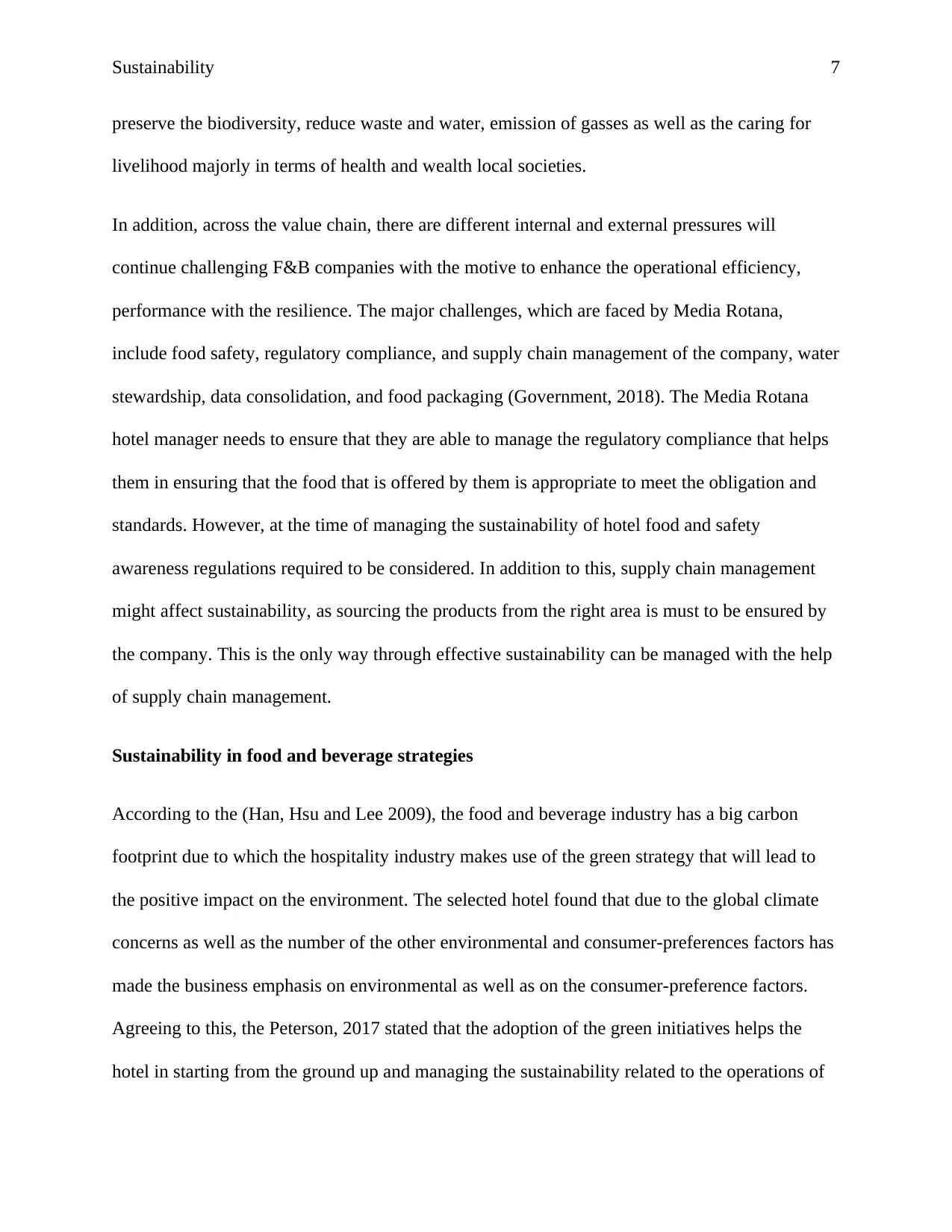
Sustainability 7
preserve the biodiversity, reduce waste and water, emission of gasses as well as the caring for
livelihood majorly in terms of health and wealth local societies.
In addition, across the value chain, there are different internal and external pressures will
continue challenging F&B companies with the motive to enhance the operational efficiency,
performance with the resilience. The major challenges, which are faced by Media Rotana,
include food safety, regulatory compliance, and supply chain management of the company, water
stewardship, data consolidation, and food packaging (Government, 2018). The Media Rotana
hotel manager needs to ensure that they are able to manage the regulatory compliance that helps
them in ensuring that the food that is offered by them is appropriate to meet the obligation and
standards. However, at the time of managing the sustainability of hotel food and safety
awareness regulations required to be considered. In addition to this, supply chain management
might affect sustainability, as sourcing the products from the right area is must to be ensured by
the company. This is the only way through effective sustainability can be managed with the help
of supply chain management.
Sustainability in food and beverage strategies
According to the (Han, Hsu and Lee 2009), the food and beverage industry has a big carbon
footprint due to which the hospitality industry makes use of the green strategy that will lead to
the positive impact on the environment. The selected hotel found that due to the global climate
concerns as well as the number of the other environmental and consumer-preferences factors has
made the business emphasis on environmental as well as on the consumer-preference factors.
Agreeing to this, the Peterson, 2017 stated that the adoption of the green initiatives helps the
hotel in starting from the ground up and managing the sustainability related to the operations of
preserve the biodiversity, reduce waste and water, emission of gasses as well as the caring for
livelihood majorly in terms of health and wealth local societies.
In addition, across the value chain, there are different internal and external pressures will
continue challenging F&B companies with the motive to enhance the operational efficiency,
performance with the resilience. The major challenges, which are faced by Media Rotana,
include food safety, regulatory compliance, and supply chain management of the company, water
stewardship, data consolidation, and food packaging (Government, 2018). The Media Rotana
hotel manager needs to ensure that they are able to manage the regulatory compliance that helps
them in ensuring that the food that is offered by them is appropriate to meet the obligation and
standards. However, at the time of managing the sustainability of hotel food and safety
awareness regulations required to be considered. In addition to this, supply chain management
might affect sustainability, as sourcing the products from the right area is must to be ensured by
the company. This is the only way through effective sustainability can be managed with the help
of supply chain management.
Sustainability in food and beverage strategies
According to the (Han, Hsu and Lee 2009), the food and beverage industry has a big carbon
footprint due to which the hospitality industry makes use of the green strategy that will lead to
the positive impact on the environment. The selected hotel found that due to the global climate
concerns as well as the number of the other environmental and consumer-preferences factors has
made the business emphasis on environmental as well as on the consumer-preference factors.
Agreeing to this, the Peterson, 2017 stated that the adoption of the green initiatives helps the
hotel in starting from the ground up and managing the sustainability related to the operations of
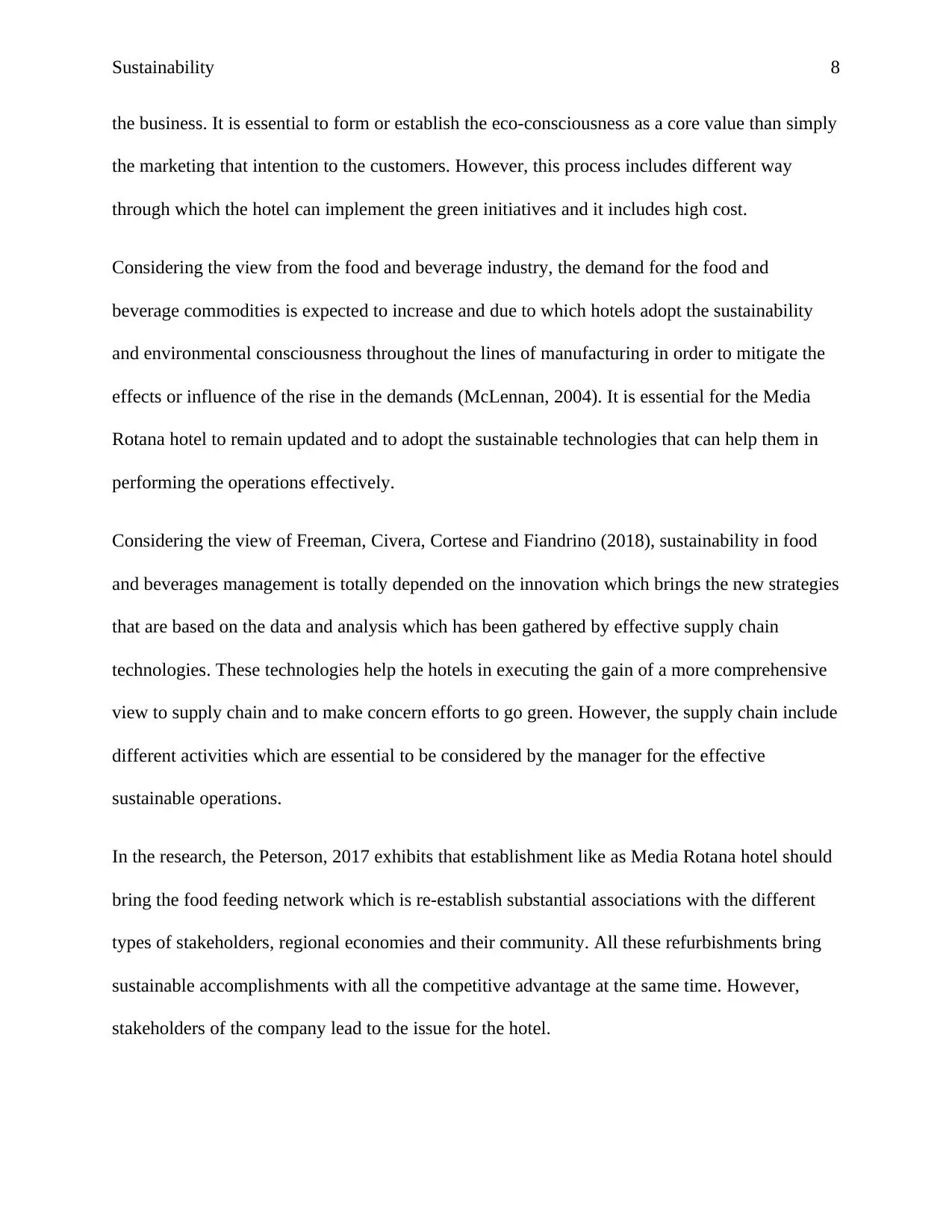
Sustainability 8
the business. It is essential to form or establish the eco-consciousness as a core value than simply
the marketing that intention to the customers. However, this process includes different way
through which the hotel can implement the green initiatives and it includes high cost.
Considering the view from the food and beverage industry, the demand for the food and
beverage commodities is expected to increase and due to which hotels adopt the sustainability
and environmental consciousness throughout the lines of manufacturing in order to mitigate the
effects or influence of the rise in the demands (McLennan, 2004). It is essential for the Media
Rotana hotel to remain updated and to adopt the sustainable technologies that can help them in
performing the operations effectively.
Considering the view of Freeman, Civera, Cortese and Fiandrino (2018), sustainability in food
and beverages management is totally depended on the innovation which brings the new strategies
that are based on the data and analysis which has been gathered by effective supply chain
technologies. These technologies help the hotels in executing the gain of a more comprehensive
view to supply chain and to make concern efforts to go green. However, the supply chain include
different activities which are essential to be considered by the manager for the effective
sustainable operations.
In the research, the Peterson, 2017 exhibits that establishment like as Media Rotana hotel should
bring the food feeding network which is re-establish substantial associations with the different
types of stakeholders, regional economies and their community. All these refurbishments bring
sustainable accomplishments with all the competitive advantage at the same time. However,
stakeholders of the company lead to the issue for the hotel.
the business. It is essential to form or establish the eco-consciousness as a core value than simply
the marketing that intention to the customers. However, this process includes different way
through which the hotel can implement the green initiatives and it includes high cost.
Considering the view from the food and beverage industry, the demand for the food and
beverage commodities is expected to increase and due to which hotels adopt the sustainability
and environmental consciousness throughout the lines of manufacturing in order to mitigate the
effects or influence of the rise in the demands (McLennan, 2004). It is essential for the Media
Rotana hotel to remain updated and to adopt the sustainable technologies that can help them in
performing the operations effectively.
Considering the view of Freeman, Civera, Cortese and Fiandrino (2018), sustainability in food
and beverages management is totally depended on the innovation which brings the new strategies
that are based on the data and analysis which has been gathered by effective supply chain
technologies. These technologies help the hotels in executing the gain of a more comprehensive
view to supply chain and to make concern efforts to go green. However, the supply chain include
different activities which are essential to be considered by the manager for the effective
sustainable operations.
In the research, the Peterson, 2017 exhibits that establishment like as Media Rotana hotel should
bring the food feeding network which is re-establish substantial associations with the different
types of stakeholders, regional economies and their community. All these refurbishments bring
sustainable accomplishments with all the competitive advantage at the same time. However,
stakeholders of the company lead to the issue for the hotel.
⊘ This is a preview!⊘
Do you want full access?
Subscribe today to unlock all pages.

Trusted by 1+ million students worldwide
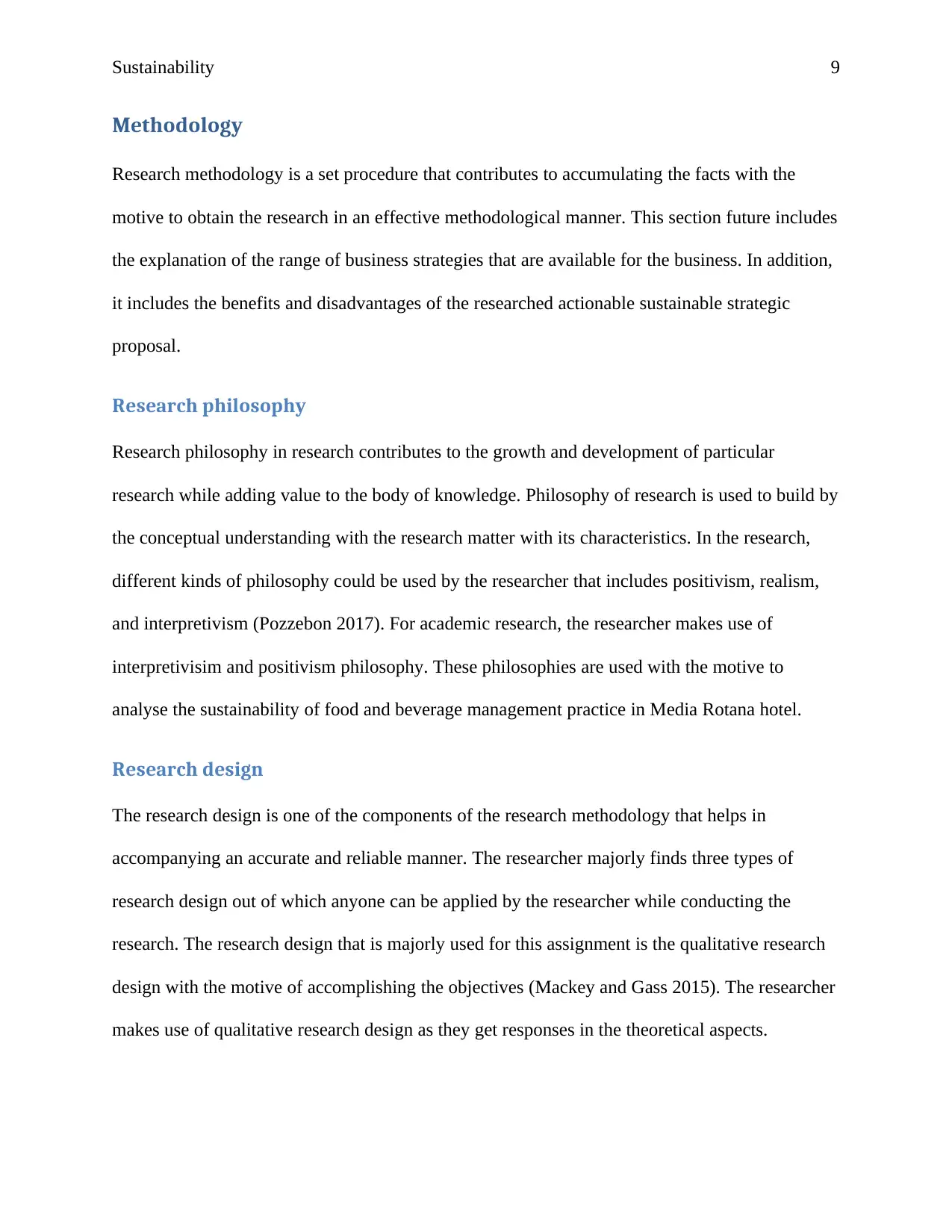
Sustainability 9
Methodology
Research methodology is a set procedure that contributes to accumulating the facts with the
motive to obtain the research in an effective methodological manner. This section future includes
the explanation of the range of business strategies that are available for the business. In addition,
it includes the benefits and disadvantages of the researched actionable sustainable strategic
proposal.
Research philosophy
Research philosophy in research contributes to the growth and development of particular
research while adding value to the body of knowledge. Philosophy of research is used to build by
the conceptual understanding with the research matter with its characteristics. In the research,
different kinds of philosophy could be used by the researcher that includes positivism, realism,
and interpretivism (Pozzebon 2017). For academic research, the researcher makes use of
interpretivisim and positivism philosophy. These philosophies are used with the motive to
analyse the sustainability of food and beverage management practice in Media Rotana hotel.
Research design
The research design is one of the components of the research methodology that helps in
accompanying an accurate and reliable manner. The researcher majorly finds three types of
research design out of which anyone can be applied by the researcher while conducting the
research. The research design that is majorly used for this assignment is the qualitative research
design with the motive of accomplishing the objectives (Mackey and Gass 2015). The researcher
makes use of qualitative research design as they get responses in the theoretical aspects.
Methodology
Research methodology is a set procedure that contributes to accumulating the facts with the
motive to obtain the research in an effective methodological manner. This section future includes
the explanation of the range of business strategies that are available for the business. In addition,
it includes the benefits and disadvantages of the researched actionable sustainable strategic
proposal.
Research philosophy
Research philosophy in research contributes to the growth and development of particular
research while adding value to the body of knowledge. Philosophy of research is used to build by
the conceptual understanding with the research matter with its characteristics. In the research,
different kinds of philosophy could be used by the researcher that includes positivism, realism,
and interpretivism (Pozzebon 2017). For academic research, the researcher makes use of
interpretivisim and positivism philosophy. These philosophies are used with the motive to
analyse the sustainability of food and beverage management practice in Media Rotana hotel.
Research design
The research design is one of the components of the research methodology that helps in
accompanying an accurate and reliable manner. The researcher majorly finds three types of
research design out of which anyone can be applied by the researcher while conducting the
research. The research design that is majorly used for this assignment is the qualitative research
design with the motive of accomplishing the objectives (Mackey and Gass 2015). The researcher
makes use of qualitative research design as they get responses in the theoretical aspects.
Paraphrase This Document
Need a fresh take? Get an instant paraphrase of this document with our AI Paraphraser
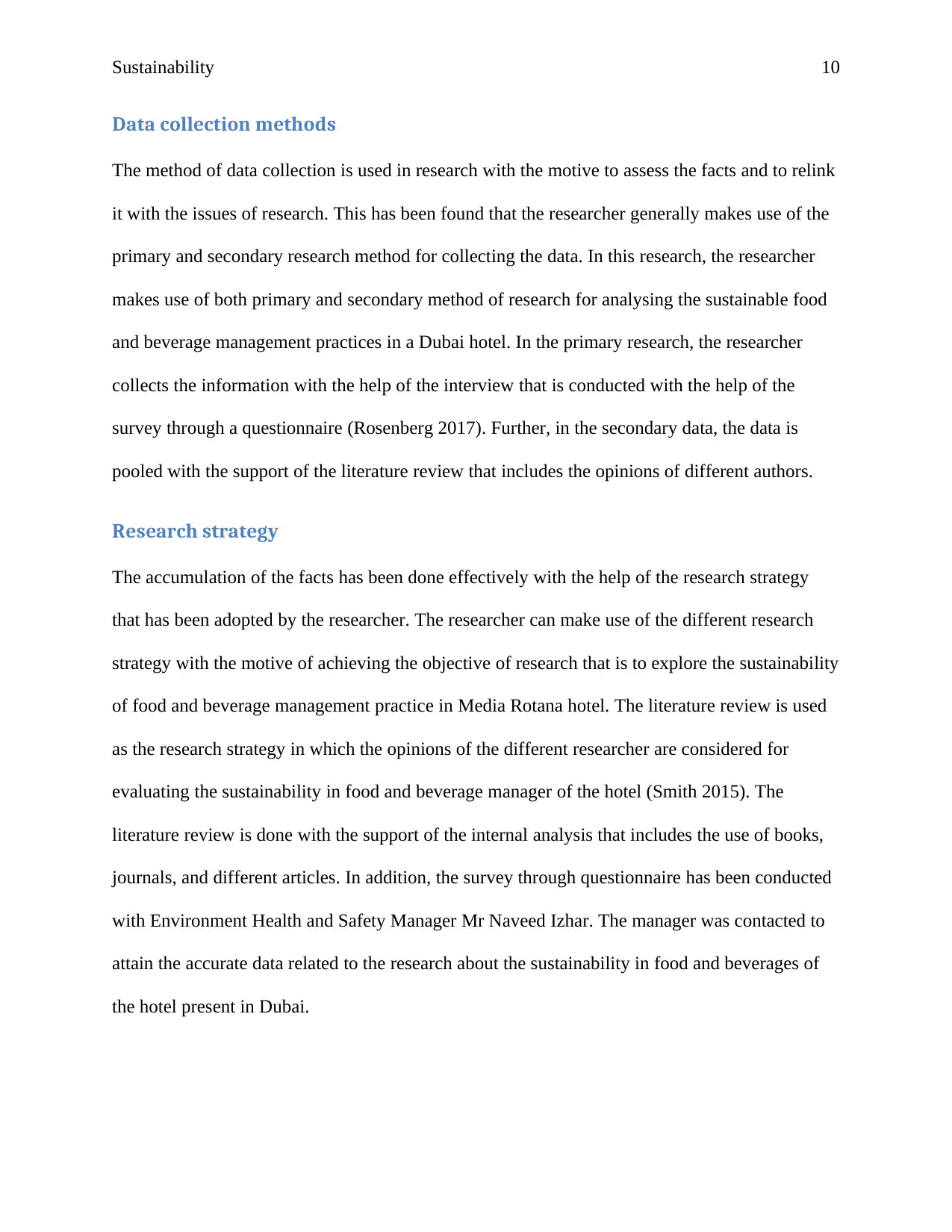
Sustainability 10
Data collection methods
The method of data collection is used in research with the motive to assess the facts and to relink
it with the issues of research. This has been found that the researcher generally makes use of the
primary and secondary research method for collecting the data. In this research, the researcher
makes use of both primary and secondary method of research for analysing the sustainable food
and beverage management practices in a Dubai hotel. In the primary research, the researcher
collects the information with the help of the interview that is conducted with the help of the
survey through a questionnaire (Rosenberg 2017). Further, in the secondary data, the data is
pooled with the support of the literature review that includes the opinions of different authors.
Research strategy
The accumulation of the facts has been done effectively with the help of the research strategy
that has been adopted by the researcher. The researcher can make use of the different research
strategy with the motive of achieving the objective of research that is to explore the sustainability
of food and beverage management practice in Media Rotana hotel. The literature review is used
as the research strategy in which the opinions of the different researcher are considered for
evaluating the sustainability in food and beverage manager of the hotel (Smith 2015). The
literature review is done with the support of the internal analysis that includes the use of books,
journals, and different articles. In addition, the survey through questionnaire has been conducted
with Environment Health and Safety Manager Mr Naveed Izhar. The manager was contacted to
attain the accurate data related to the research about the sustainability in food and beverages of
the hotel present in Dubai.
Data collection methods
The method of data collection is used in research with the motive to assess the facts and to relink
it with the issues of research. This has been found that the researcher generally makes use of the
primary and secondary research method for collecting the data. In this research, the researcher
makes use of both primary and secondary method of research for analysing the sustainable food
and beverage management practices in a Dubai hotel. In the primary research, the researcher
collects the information with the help of the interview that is conducted with the help of the
survey through a questionnaire (Rosenberg 2017). Further, in the secondary data, the data is
pooled with the support of the literature review that includes the opinions of different authors.
Research strategy
The accumulation of the facts has been done effectively with the help of the research strategy
that has been adopted by the researcher. The researcher can make use of the different research
strategy with the motive of achieving the objective of research that is to explore the sustainability
of food and beverage management practice in Media Rotana hotel. The literature review is used
as the research strategy in which the opinions of the different researcher are considered for
evaluating the sustainability in food and beverage manager of the hotel (Smith 2015). The
literature review is done with the support of the internal analysis that includes the use of books,
journals, and different articles. In addition, the survey through questionnaire has been conducted
with Environment Health and Safety Manager Mr Naveed Izhar. The manager was contacted to
attain the accurate data related to the research about the sustainability in food and beverages of
the hotel present in Dubai.
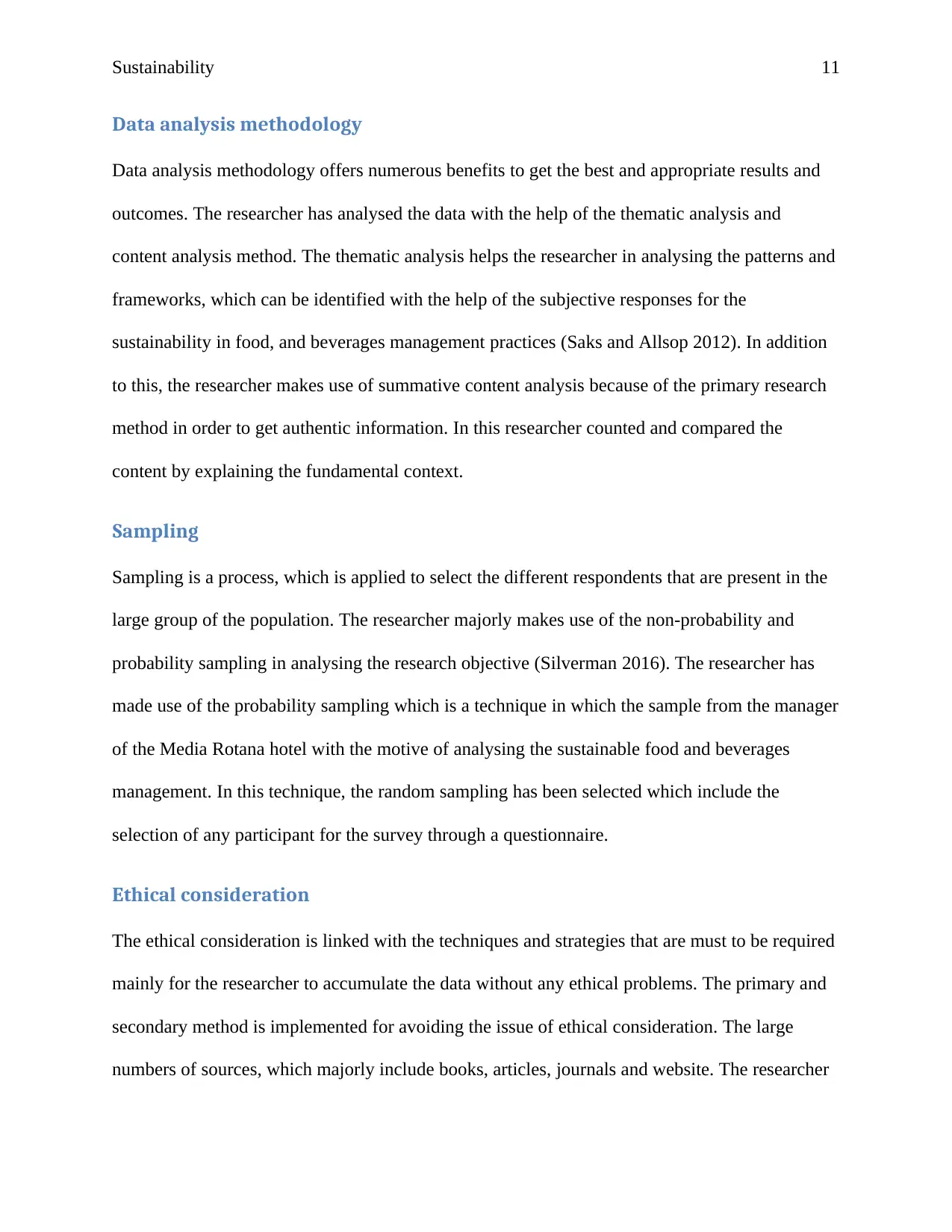
Sustainability 11
Data analysis methodology
Data analysis methodology offers numerous benefits to get the best and appropriate results and
outcomes. The researcher has analysed the data with the help of the thematic analysis and
content analysis method. The thematic analysis helps the researcher in analysing the patterns and
frameworks, which can be identified with the help of the subjective responses for the
sustainability in food, and beverages management practices (Saks and Allsop 2012). In addition
to this, the researcher makes use of summative content analysis because of the primary research
method in order to get authentic information. In this researcher counted and compared the
content by explaining the fundamental context.
Sampling
Sampling is a process, which is applied to select the different respondents that are present in the
large group of the population. The researcher majorly makes use of the non-probability and
probability sampling in analysing the research objective (Silverman 2016). The researcher has
made use of the probability sampling which is a technique in which the sample from the manager
of the Media Rotana hotel with the motive of analysing the sustainable food and beverages
management. In this technique, the random sampling has been selected which include the
selection of any participant for the survey through a questionnaire.
Ethical consideration
The ethical consideration is linked with the techniques and strategies that are must to be required
mainly for the researcher to accumulate the data without any ethical problems. The primary and
secondary method is implemented for avoiding the issue of ethical consideration. The large
numbers of sources, which majorly include books, articles, journals and website. The researcher
Data analysis methodology
Data analysis methodology offers numerous benefits to get the best and appropriate results and
outcomes. The researcher has analysed the data with the help of the thematic analysis and
content analysis method. The thematic analysis helps the researcher in analysing the patterns and
frameworks, which can be identified with the help of the subjective responses for the
sustainability in food, and beverages management practices (Saks and Allsop 2012). In addition
to this, the researcher makes use of summative content analysis because of the primary research
method in order to get authentic information. In this researcher counted and compared the
content by explaining the fundamental context.
Sampling
Sampling is a process, which is applied to select the different respondents that are present in the
large group of the population. The researcher majorly makes use of the non-probability and
probability sampling in analysing the research objective (Silverman 2016). The researcher has
made use of the probability sampling which is a technique in which the sample from the manager
of the Media Rotana hotel with the motive of analysing the sustainable food and beverages
management. In this technique, the random sampling has been selected which include the
selection of any participant for the survey through a questionnaire.
Ethical consideration
The ethical consideration is linked with the techniques and strategies that are must to be required
mainly for the researcher to accumulate the data without any ethical problems. The primary and
secondary method is implemented for avoiding the issue of ethical consideration. The large
numbers of sources, which majorly include books, articles, journals and website. The researcher
⊘ This is a preview!⊘
Do you want full access?
Subscribe today to unlock all pages.

Trusted by 1+ million students worldwide
1 out of 23
Related Documents
Your All-in-One AI-Powered Toolkit for Academic Success.
+13062052269
info@desklib.com
Available 24*7 on WhatsApp / Email
![[object Object]](/_next/static/media/star-bottom.7253800d.svg)
Unlock your academic potential
Copyright © 2020–2025 A2Z Services. All Rights Reserved. Developed and managed by ZUCOL.





